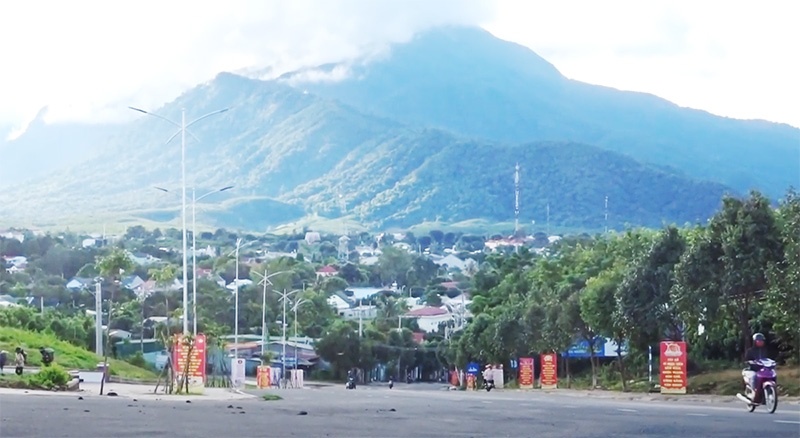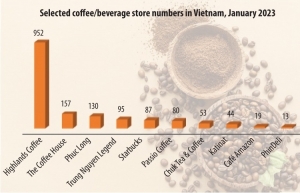The smallholder role in commodity chains
 |
| Town of Sa Thay district, Kon Tum province, source: Youtube.com |
“Sold to private merchants,” A Diu explained. They are proprietors of stores selling agricultural supplies and foodstuffs door-to-door in the commune. According to A Diu, dealers often provide homes with fertilisers, insecticides, and cash. When harvested, households will return the produce. Many families in K’Bay, like those in A Diu, are unaware of where merchants sell their wares.
Vietnam has more than nine million farmers living in mountainous areas. Similar to A Diu, millions of these families produce agro-forestry goods including coffee, rubber, and plantation wood. The output market for these families’ goods consists of merchants who reside in the same commune or as far away as possible within the same district. Vietnam’s agricultural productivity is modest, with farmers playing the primary role in production. Until now, the self-sufficient mode of production has almost been superseded by the commodity mode of production. The vast majority of crops produced in Vietnam, including coffee, rubber, and plantation wood, are exported. Coffe from A Diu’s small farm can be found in renowned cafés in the likes of Frankfurt or New York.
Households in the hilly area in the central province of Quang Tri planted acacia trees that may be seen at IKEA shops in the United States. The network of traders, or middlemen, with a number in the tens of thousands – perhaps hundreds of thousands – reaches all corners of the country. These traders are responsible for linking farmers, such as the Diu family, as well as millions of other families, to the market. They are a vital stage of global supply chains on a variety of commodities.
Typically, communal merchants gather agri-forestry products from commune families and sell them to district market traders. The process continues until the farmer’s product is processed, which is often the responsibility of exporting corporations. The form of a direct link between farmers and export-processing businesses, hence shortened supply chains, has now been developed, although its scope is still restricted. Many export processing organisations lack in-depth knowledge of the product supply chain.
Smallholder growers play a crucial role, contributing to the growth of agricultural export sectors today. The US, EU, Japan, South Korea, and China are key markets for Vietnam’s agri-forestry products. In the timber business, more than one million families participate in afforestation, with their supply of raw wood constituting an essential role in the industry’s overall export turnover of over $15 billion at present.
These smallholder tree growers also directly contribute to the Vietnamese wood sector’s fifth-largest position worldwide and second-largest in Asia in terms of export turnover. Similarly, for the coffee industry, 600,000 smallholder growers occupying nearly the entire coffee area of the country (0.69 million hectares) play the most crucial role in generating over $3 billion in export turnover annually for the industry, bringing the country to second place worldwide in export turnover.
Every year, about 265,000 smallholder rubber-producing families supply more than 60 per cent of raw rubber for the industry. This is a high supply of critical raw materials to produce an export value of around $5.5 billion per year for the sector.
Tackling climate change is a top priority in the sustainable development strategies of many nations. The EU has adopted deforestation regulations that ban products associated with deforestation placed on the EU market. A similar mechanism is being considered by other governments. In the future, products that endanger the environment, such as cause deforestation or negatively impact biodiversity resources will not be allowed to trade in Vietnam’s major export markets.
Vietnam’s exports to major markets, such as coffee, rubber, and wooden furniture, must not only follow the terms of existing agreements but also adhere to new regulations. This is a significant obstacle for several businesses, particularly small businesses with complicated supply chains that rely on a network of traders to provide raw materials as facing resource constraints they are unable to control their supply chains.
Firms that export are required to comply with export market rules, including environmental and social requirements. To do this, businesses must comprehend market needs, establish a robust system to control their present supply networks, and modify and adapt their supply chains to match market requirements.
To foster creation of ties between export processing enterprises and smallholder growers, the existing policy environment should be modified in a more meaningful and specific way that facilitates the connection. Lessons learned from various forms of links between enterprises and smallholders in the forestry and rubber sectors demonstrate the importance of local government, which has the potential in facilitating connections by providing reliable information to the companies and smallholders and providing training.
Additionally, they may construct a protection mechanism for farmers who are members of disadvantaged groups when they join the organisation. This direct collaboration will optimise financial resources, management levels, sci-tech, and farmer’s land and labour resources.
 | Coffee chains shaking up habits and business tactics The United States and Vietnam, with the high consumer demand and fast-growing markets, are continuing to be promised lands for coffee and beverage brands on both sides. |
 | Business integrity passport to global supply chains Experts are urging Vietnamese firms to incorporate integrity principles into their corporate governance since they believe business integrity would be the passport to global supply chains. |
 | Coffee chains set on physical growth The journey of business growth and innovation is being boosted in Vietnam’s food and beverage market as businesses decide to close the door on a period of turmoil in search of breakthroughs this year. |
(*)To Xuan Phuc, Managing director, Forest Trends
What the stars mean:
★ Poor ★ ★ Promising ★★★ Good ★★★★ Very good ★★★★★ Exceptional
Related Contents
Latest News
More News
- State corporations poised to drive 2026 growth (February 03, 2026 | 13:58)
- Why high-tech talent will define Vietnam’s growth (February 02, 2026 | 10:47)
- FMCG resilience amid varying storms (February 02, 2026 | 10:00)
- Customs reforms strengthen business confidence, support trade growth (February 01, 2026 | 08:20)
- Vietnam and US to launch sixth trade negotiation round (January 30, 2026 | 15:19)
- Digital publishing emerges as key growth driver in Vietnam (January 30, 2026 | 10:59)
- EVN signs key contract for Tri An hydropower expansion (January 30, 2026 | 10:57)
- Vietnam to lead trade growth in ASEAN (January 29, 2026 | 15:08)
- Carlsberg Vietnam delivers Lunar New Year support in central region (January 28, 2026 | 17:19)
- TikTok penalised $35,000 in Vietnam for consumer protection violations (January 28, 2026 | 17:15)

 Tag:
Tag:




















 Mobile Version
Mobile Version